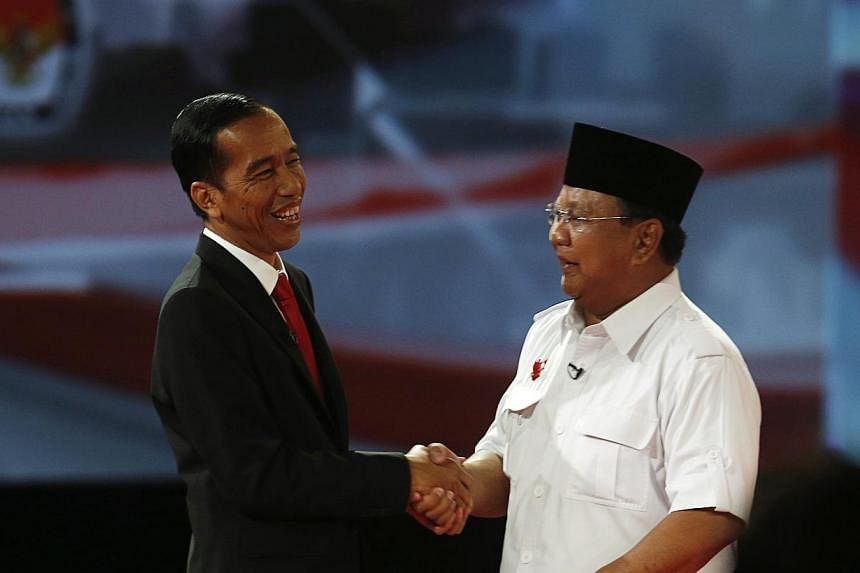THE contrast between Jakarta governor Joko Widodo and his opponent Prabowo Subianto was on sharp display on Sunday night when the two presidential candidates met for a second round of televised debates, this time without their running mates.
Their topic: economic development and social welfare, issues close to the heart of the country's 186 million voters as well as multinationals operating in South-east Asia's largest economy.
Mr Joko, or Jokowi as he is commonly known, spoke first and told a story about the hopes and aspirations of ordinary Indonesians he had met in recent weeks.
He recounted how a washerwoman from Manado, a fisherman from Belawan near Medan, a farmer from Central Java and a teacher in West Java told him how they wished for the kind of economic development that would improve their own well-being as well. He assured them that the country's economic growth would be equitably shared.
In contrast, Mr Prabowo, a former special forces general, went straight into the mission at hand and outlined what he saw as the nub of the problem afflicting the economy - how can the government afford the money for all the programmes it had promised, such as free education and healthcare?
He also pledged to fix the "leakage" of what he estimated was 1,000 trillion rupiah (S$110 billion) from the economy due to corruption, a point he repeated several times throughout the two hours.
Viewers and observers felt Mr Prabowo came across as more forceful during the debate - the second of five scheduled ahead of the July 9 presidential election.
But many also felt Mr Joko held his own by drawing on his experience in business and bureaucracy to address the debate topic of economic development and social welfare.
Despite the clear contrast between the two candidates, observers and instant-polls judged yesterday's counter to be a draw. Mr Joko and his running mate Jusuf Kalla were judged to have won the opening debate last week.
A quick poll by pollster Indikator Politik Indonesia conducted right after the debate ended on Sunday night found 47.2 per cent of a sample of 451 respondents felt Mr Joko performed better, and 46.5 per cent felt Mr Prabowo came off better.
But more interestingly, 51.3 per cent of respondents from rural areas felt Mr Joko did better against 44.4 per cent for Mr Prabowo.
The reverse was the case for urban areas, where only 43.1 per cent felt Mr Joko did better against 48.6 per cent for Mr Prabowo.
"Prabowo had greater mastery of the stage, but people felt Jokowi had a better communication style," political scientist Burhanuddin Muhtadi of Indikator told a discussion on broadcaster MetroTV after the debate.
Sunday's debate allowed the candidates to ask questions directly to one another, and Mr Prabowo made use of the opportunity to press Mr Joko on his plans to manage the economy and his nationalistic credentials.
Mr Joko's replies signaled he would honour existing business contracts, improve the investment climate, but at the same time protect local businesses from open competition when the Asean Economic Community (AEC) comes about in end 2015.
The AEC will open certain sectors of the economy to greater competition.
But Mr Joko said Indonesia also needed a strategy to lift its small and medium enterprises and make sure its companies penetrated other markets first.
At the same time, he said: "We should not give too big an opportunity to others. Wherever we want to set up shop, there are also barriers."
Mr Joko also said he was confident the economy could grow above seven per cent a year - it is projected to grow just above 5 per cent this year - provided the investment and regulatory climate was improved so that investors get opportunities to create jobs.
Mr Prabowo, in turn, sought to drive home the nationalistic edge of his policy platform, which called for annual growth of up to 10 per cent and a "big push" strategy to revive the economy based on agricultural innovation, among others.
Foreign investment was welcome, he said, but it had to benefit Indonesians.
Pressed about the cause of the country's trade and budget deficits, he repeated his argument that they were the result of wealth leaking out of the country.
"Our struggle aims to bring about a strong economy, that stands on its own feet, that protects the nation's wealth so Indonesia's riches do not flow out the country," he said.

